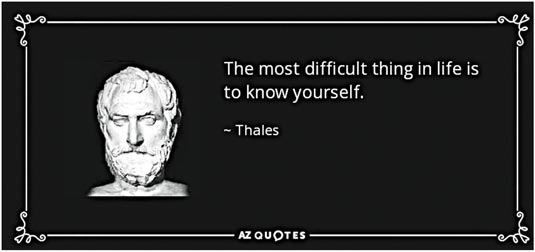Prospects of personality
 We
pondered on the aspect of personality last week. Personalities of people
play a pivotal role in their personal and professional fronts. Let's
discuss further the salient features of personality. We
pondered on the aspect of personality last week. Personalities of people
play a pivotal role in their personal and professional fronts. Let's
discuss further the salient features of personality.
Recap of personality
Personality can also be viewed as the sum total of characteristics
that differentiate people or the stability in a person's behaviour
across different situations. During a given situation, one may fight and
the other may take flight. The response reveals their personalities.
As we saw last week, a variety of attempts were made to measure
personality in a scientific manner. The Myers-Briggs Type Indicator (MBTI)
assessment is the most popular personality measurement in the world. It
is a psychometric questionnaire designed to measure psychological
preferences in how people perceive the world and make decisions.
Work environments influence how comfortable you are at your job.
Someone with a preference for introversion, for example, who has to do a
lot of detailed work or think through a problem, may find it disruptive
to be in an environment that is too loud or where a lot of interaction
is needed. When you know this about yourself, you can make arrangements
to do your work in a more suitable location or at a time when there is
less activity and interference.
Even when circumstances make it necessary for you to do work that you
have not chosen or which you must do as part of your overall job
description, knowledge and understanding of type of personality can help
you discover and use your strengths to accomplish the work. When you
find an unsatisfactory job fit, you can examine the reasons and seek
solutions based on your preferences.
 When you have an opportunity to take a new path in your work, it can
help you analyse your past work and consider what new direction can best
fit your preferences. When you have an opportunity to take a new path in your work, it can
help you analyse your past work and consider what new direction can best
fit your preferences.
Big Five
Personality researchers have proposed that there are five basic
dimensions of personality. These are often referred to as the Big Five.
Previous trait theorists had suggested a number of possible traits,
including Gordon Allport's list of 4,000 personality traits, Raymond
Cattell's 16 personality factors and Hans Eysenck's three-factor theory.
Today, many researchers agree that they are five core personality
traits. Evidence of this theory has been growing over the past 50 years,
beginning with the research of D. W. Fiske (1949) and later expanded
upon by other researchers including Norman (1967), Smith (1967),
Goldberg (1981), and McCrae and Costa (1987).
The 'big five' are broad categories of personality traits. While
there is a significant body of literature supporting the five-factor
model of personality, researchers don't always agree on the exact labels
for each dimension.
However, the five categories are usually described as:
Extraversion. This trait includes characteristics such as
excitability, sociability, talkativeness, assertiveness and high amounts
of emotional expressiveness.
Agreeableness. This personality dimension includes attributes such as
trust, altruism, kindness, affection, and other pro-social behaviour.
Conscientiousness. Common features of this dimension include high
levels of thoughtfulness, with good impulse control and goal-directed
behaviour. Those high in conscientiousness tend to be organised and
mindful of details.
Emotional stability. People high in this trait tend to experience
greater control of their emotions such as anger. It involves a person's
steadiness of mood, ability to withstand minor setbacks, failures,
difficulties, and other stress.
Openness to experience. Openness involves active imagination,
aesthetic sensitivity, attentiveness to inner feelings, preference for
variety and intellectual curiosity.
The above five dimensions represent broad areas of personality.
Research has demonstrated that these groupings of characteristics tend
to occur together in many people. For example, people who are sociable
tend to be talkative. However, these traits do not always occur
together.
These are not 'types' of personalities, but dimensions of
personality. So someone's personality is the combination of each of
their Big Five personality characteristics. For example, someone may be
very sociable (high extraversion), not very friendly (low
agreeableness), hard working (high conscientiousness), easily stressed
(low emotional stability) and extremely creative (high intellect).
Way forward
It was Thales, the first philosopher in Greek tradition, who said,
"Know thyself". Being aware of your personality is one sure way of
discovering you better. Such an awareness can also be extended to areas
such as recruitment to ensure a proper person-position match. It also
helps to enrich our relationships in personal and professional fronts,
in knowing someone better.
The fundamental message here is to ensure the match between 'who you
are' versus 'what you do'. Satisfied and fruitful carriers are built
around people handling things in areas where they have a flare. What it
says is simple: 'Do what you are'.
The writer is the Director of the Postgraduate Institute of
Management. He also serves as an Adjunct Professor in the Division of
Management and Entrepreneurship, Price College of Business, University
of Oklahoma, USA. |

